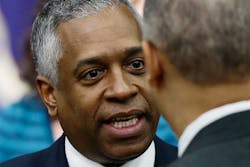Obama's ATF Nominee Runs Into Senate Opposition
WASHINGTON, D.C. --The acting director of the Bureau of Alcohol, Tobacco, Firearms and Explosives, who took over the agency in its meltdown with the Fast and Furious gun-tracking scandal, ran into opposition Tuesday when he appeared before the Senate Judiciary Committee for consideration as permanent director.
Disturbed by allegations that B. Todd Jones had mismanaged his other current role as the U.S. attorney in Minnesota, Republicans said they hoped to block or delay his appointment until an internal investigation into his leadership of that office could be completed.
President Obama nominated Jones as permanent ATF director last year after the school shooting in Newtown, Conn. But his chance of success has been difficult to gauge. No one has made it to the post since 2006, when the job began requiring Senate confirmation and the National Rifle Assn. started vigorously opposing nominees.
"I think that's wrong," said Sen. Amy Klobuchar, a Democrat from Minnesota, suggesting that critics have hijacked the confirmation process. "Something is wrong when we have ATF agents on the front lines of a major investigation like the Boston Marathon bombing figuring out who did it and what happened, and yet the Senate still won't confirm a permanent member of this agency."
But Sen. Charles E. Grassley of Iowa, the panel's ranking Republican, said Jones had been accused of gross mismanagement and retaliation against his staff in the federal prosecutor's office in Minnesota, allegations that the Department of Justice's Office of Special Counsel is investigating.
"These are serious charges," Grassley said. "The public interest demands resolution of these issues."
He urged the committee to postpone a confirmation vote until the investigation was done. Otherwise, he said, "we're left today to take Mr. Jones' word and have no way of independently verifying what he says."
When he took over in September 2011 as acting ATF director, Jones said, he "found an organization in distress." He said he appointed 22 new special agents to run ATF field offices, assigned 23 new executives to ATF headquarters and ordered a "top-to-bottom" review of the bureau.
Jones said none of the managers in Arizona and Washington connected to Fast and Furious kept their supervisory jobs. The failed operation on the U.S.-Mexico border was designed to track weapons smuggled to Mexican drug cartels, but thousands of weapons were lost.
"We knew there was a failure in leadership," he said. "They either retired, resigned or left. They are no longer in positions of responsibility and leadership at ATF."
Jones noted, for instance, that William McMahon, head of ATF field operations, was terminated and that a decision on William Newell, the special agent in charge of the Phoenix field office, was "forthcoming."
"We did not stand idly by and not take corrective action, including disciplinary action," he said. But the disciplinary process is often complex and, he said, "sometimes painfully slow."
As to complaints about his management of the U.S. attorney's office in Minnesota, Jones said he had not been interviewed by the Office of Special Counsel.
"I have always taken very seriously the duty my office has to follow all the laws and regulations," he said, denying he ever took "adverse actions against anyone" he worked with.
"I was quite surprised by the nature of the allegations," he said.
Other complaints have accused Jones of having a rigid management style in Minneapolis, and of making a stern video that advised ATF agents against going public with internal problems, as was done in Fast and Furious.
But Jones told the committee that when he became U.S. attorney in 2009, he made many staff adjustments. "Quite frankly, I've been an agent of change, and change at times is hard to deal with. Sometimes folks are not happy with the direction overall," he said.
A group of FBI and Justice Department officials, as well as police organizations, have written to the committee in support of Jones' confirmation, but Grassley asked Jones about a letter from Donald Oswald, former special agent in charge of the FBI's Minneapolis field office, accusing him of "poor leadership" and "an atrocious professional reputation."
Jones said he had worked closely with Oswald and was "quite shocked" by the letter.
On the issue of enforcement, Sen. Ted Cruz (R-Texas) said that not enough was being done to prosecute felons who illegally buy firearms, and suggested that it had not been a priority of the Obama administration to stop so-called straw buyers. He said that of 48,000 felons who tried to buy weapons, only 44 were prosecuted.
Justice Department "resources are thin," Jones said, and "we have tough decisions to make." He added that many of those individuals ended up being prosecuted in larger criminal cases. "We've made hard decisions with our resources. Priority No. 1 is national security," he said.
Stuart F. Delery, who was nominated to be assistant attorney general for the Department of Justice's Civil Division, appeared alongside Jones before the committee, but said very little beyond introducing his family. Nearly all of the questions were directed at Jones.
Copyright 2013 - Los Angeles Times
McClatchy-Tribune News Service
